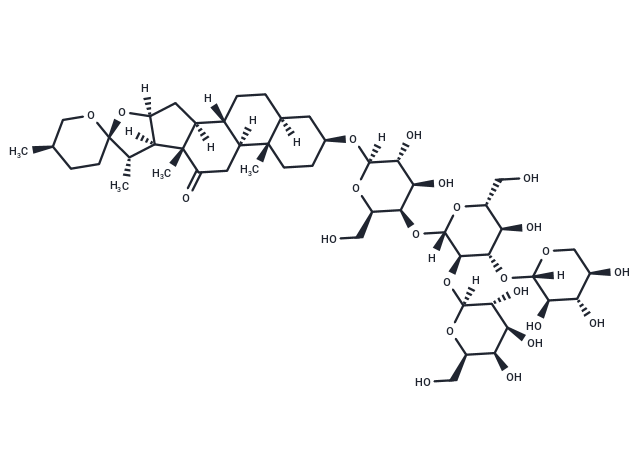Shopping Cart
- Remove All
 Your shopping cart is currently empty
Your shopping cart is currently empty

Terrestrosin D can induce apoptotic cell death and inhibit angiogenesis in xenograft tumor cells, cell cycle arrest and induction of apoptosis in cancer cells and endothelial cells might be plausible mechanisms of actions for the observed antitumor and antiangiogenic activities of terrestrosin D.

| Pack Size | Price | Availability | Quantity |
|---|---|---|---|
| 1 mg | $35 | In Stock | |
| 5 mg | $89 | In Stock | |
| 10 mg | $135 | In Stock | |
| 25 mg | $226 | In Stock | |
| 50 mg | Inquiry | In Stock | |
| 1 mL x 10 mM (in DMSO) | $157 | In Stock |
| Description | Terrestrosin D can induce apoptotic cell death and inhibit angiogenesis in xenograft tumor cells, cell cycle arrest and induction of apoptosis in cancer cells and endothelial cells might be plausible mechanisms of actions for the observed antitumor and an |
| In vitro | The aim of this study was to investigate whether Terrestrosin D (TED) inhibits the progression of castration-resistant prostate cancer and consider its mechanism. METHODS AND RESULTS: Cell cycle, mitochondrial membrane potential (ΔΨm) and apoptosis were determined by flow cytometry. Caspase-3 activity and vascular endothelial growth factor secretion were detected by a caspase-3 assay and human vascular endothelial growth factor kit, respectively. A PC-3 xenograft mouse model was used to evaluate the anticancer effect of TED in vivo. In vitro, TED strongly suppressed the growth of prostate cancer cells and endothelial cells in a dose-dependent manner. TED induced cell cycle arrest and apoptosis in PC-3 cells and human umbilical vascular endothelial cells (HUVECs). TED-induced apoptosis did not involve the caspase pathway. TED also decreased ΔΨm in PC-3 cells and HUVECs. In vivo, TED significantly suppressed tumor growth in nude mice bearing PC-3 cells, without any overt toxicity. Immunohistochemical analysis showed TED induced apoptotic cell death and inhibited angiogenesis in xenograft tumor cells. CONCLUSIONS: Cell cycle arrest and induction of apoptosis in cancer cells and endothelial cells might be plausible mechanisms of actions for the observed antitumor and antiangiogenic activities of TED. |
| Molecular Weight | 1049.16 |
| Formula | C50H80O23 |
| Cas No. | 179464-23-4 |
| Smiles | [H][C@]12C[C@@]3([H])[C@]4([H])CC[C@@]5([H])C[C@H](CC[C@]5(C)[C@@]4([H])CC(=O)[C@]3(C)[C@@]1([H])[C@H](C)[C@@]1(CC[C@@H](C)CO1)O2)O[C@]1([H])O[C@H](CO)[C@H](O[C@]2([H])O[C@H](CO)[C@@H](O)[C@H](O[C@]3([H])OC[C@@H](O)[C@H](O)[C@H]3O)[C@H]2O[C@]2([H])O[C@H](CO)[C@H](O)[C@H](O)[C@H]2O)[C@H](O)[C@H]1O |
| Relative Density. | 1.51 g/cm3 (Predicted) |
| Storage | Powder: -20°C for 3 years | In solvent: -80°C for 1 year | Shipping with blue ice. | |||||||||||||||||||||||||
| Solubility Information | DMSO: 30 mg/mL (28.59 mM), Sonication is recommended. | |||||||||||||||||||||||||
Solution Preparation Table | ||||||||||||||||||||||||||
DMSO
| ||||||||||||||||||||||||||

Copyright © 2015-2025 TargetMol Chemicals Inc. All Rights Reserved.